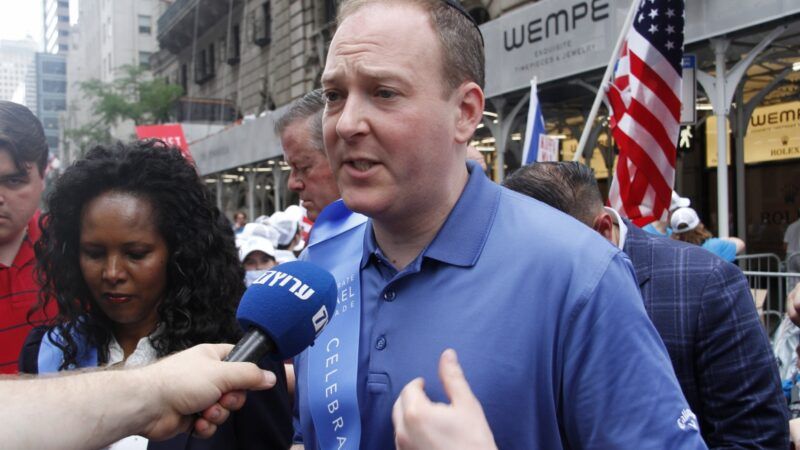Don't Blame New York's Bail Reforms for Quick Release of Congressman's Attacker
One of the candidate’s own supporters is responsible for the defendant’s release. And it may have been the right decision.

On Thursday night, in a story that seemed absurdly on-the-nose, the law-and-order-focused Republican candidate for governor of New York was assaulted on stage during a speech by a man who was then subsequently released without bail. After the candidate, Rep. Lee Zeldin (R–Long Island), and the state's Republican Party used the incident to attack the state's bail reform, it turned out the truth was a lot more complicated, and one of the candidate's own supporters was partly responsible for the attacker's release.
Zeldin is challenging Democratic Gov. Kathy Hochul for her seat. Part of his campaign is aimed at those who are worried about crime rates in the state. In 2020, New York implemented bail reforms so that those who are charged with nonviolent crimes would generally not be required to pay cash bail for their release. Zeldin is a critic of the reforms and cashless bail and wants judges to have more ability to evaluate defendants for "dangerousness" when deciding what to do with them.
On Thursday, while at a campaign stop in Perinton, 43-year-old David G. Jakubonis, of Fairport, ambled up on the raised platform where Zeldin was speaking. Video of the incident shows nobody apparently attempting to stop Jakubonis from confronting Zeldin while holding a keychain with two sharpened plastic tabs on it for self-defense. He grabbed Zeldin by the arm and muttered, "You're done." Zeldin pushed Jakubonis away, and he was taken down by the crowd and restrained. Zeldin was not injured.
Zeldin predicted that Jakubonis would quickly be released by New York's bail system, and he was correct. But that's where things get complicated. Jakubonis was released hours later after being charged with attempted assault in the second degree. This charge, under the 2020 bail reform, is not considered a violent felony. Therefore, prosecutors can't ask for cash bail. And so, sure enough, when Jakubonis was released, critics of bail reform blamed the system for letting loose a man who attacked a political candidate.
But that criticism ignores the amount of leeway that prosecutors have to decide what to charge defendants with. In this case, The New York Times notes, the Monroe County District Attorney's office could have charged Jakubonis with a violent felony that would have then allowed a judge to demand cash bail. But District Attorney Sandra Doorley did not, opting instead for a lesser charge. Her decision complicates this fight further because Doorley, it turns out, is a co-chair of Zeldin's campaign. Awkwardly, the reason that Jakubonis was freed so quickly after the attack is due to the actions of somebody on Zeldin's own team, not bail reforms. Doorley's office declined to comment to the Times on the bail issue and told them that Doorley would be recusing herself from the case.
As more facts about what happened that afternoon came out, it is arguable that Doorley's office made the right call. Despite the apparent outrageousness of a physical attack on a sitting congressman, perhaps Jakubonis doesn't need to be in a jail cell to protect the public. An FBI special agent report about the incident describes interviews with Jakubonis post-arrest. Jakubonis, an Iraq War veteran, told Monroe County sheriff's deputies on the scene that he had been drinking whiskey that day, didn't know who Zeldin was, and was somehow under the incorrect perception that Zeldin was "disrespecting veterans." Thus, he confronted the congressman and attempt to stop the speech. When he was shown a video of the confrontation, he said that he "must have checked out."
Assuming Jakubonis' statements are honest, this is not a case of somebody targeting Zeldin for his campaign positions or political affiliation or attempting some sort of act of domestic terrorism. If the purpose of bail is to make sure that people accused of crimes agree to behave and show up for court dates when they're released, the facts don't actually support demanding any cash bail out of Jakubonis. And even if a judge did have the ability to evaluate Jakubonis for "dangerousness," there doesn't seem to be any here. He perhaps needs a mental health intervention, which Joe Chenelley, a Republican candidate for New York State Assembly who was there and helped tackle Jakubonis, himself noted. That's an intervention that can take place outside of a prison cell.
Ultimately, this attack on Zeldin illustrates the complexity of the bail reform issue. Simplistic solutions, no matter how satisfying they might sound when giving campaign speeches about high crime rates, are wrong. Demanding that Jakubonis pay cash bail wouldn't make Zeldin or the community any safer given the alleged circumstances. Cash bail might have resulted in Jakubonis being stuck behind bars not because he is dangerous but because he didn't have the money to post. This is the outcome that bail reformers have been trying to prevent. And even though the judge didn't have some sort of authority to evaluate Jakubonis for dangerousness, it turns out that prosecutors can leverage the law in the determination of what to charge.
In any event, the Department of Justice subsequently arrested Jakubonis because assaulting a congressman is also a federal crime. He's now being held in federal detention and will appear before a federal judge on Wednesday. It's possible, yet again, that he'll be released from pretrial detention without having to put forth any sort of collateral. (The federal pretrial system doesn't have the same type of cash bail rules as many states, but can and does require a bond put forth by a third party or family member.) This perfectly normal operation of the federal court system probably won't prompt the same outraged headlines that were published when Monroe County released him.


Show Comments (106)